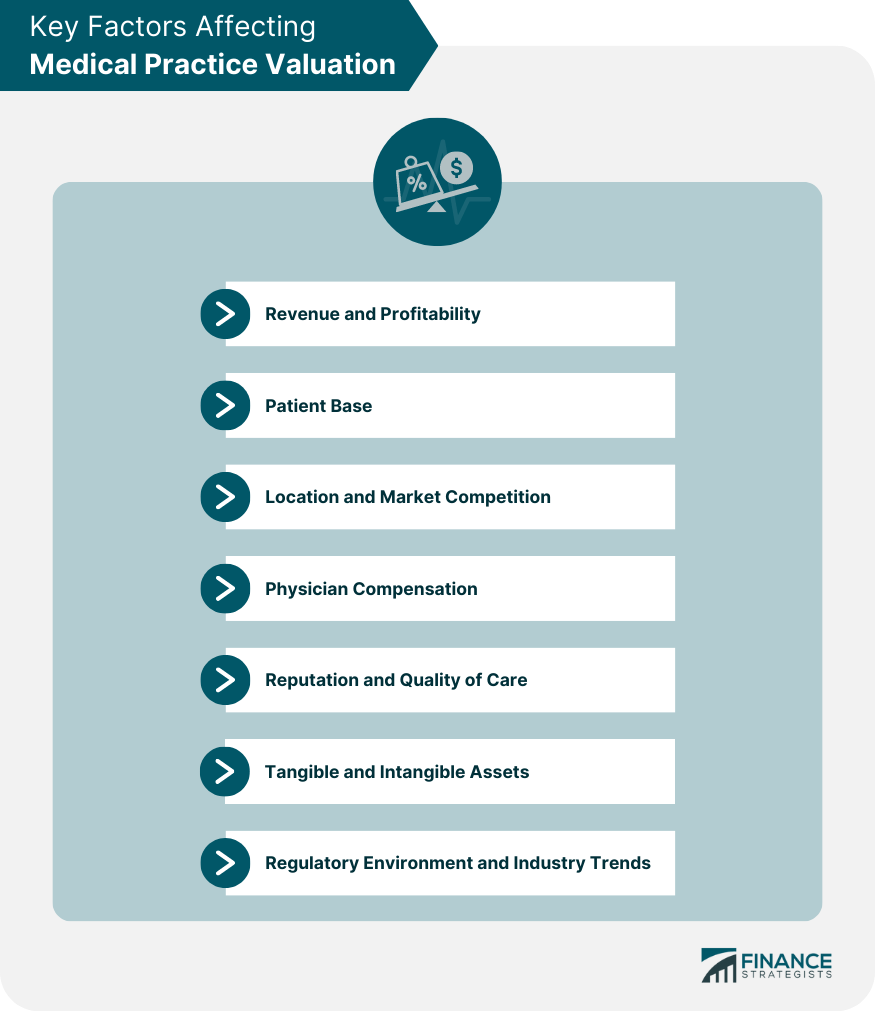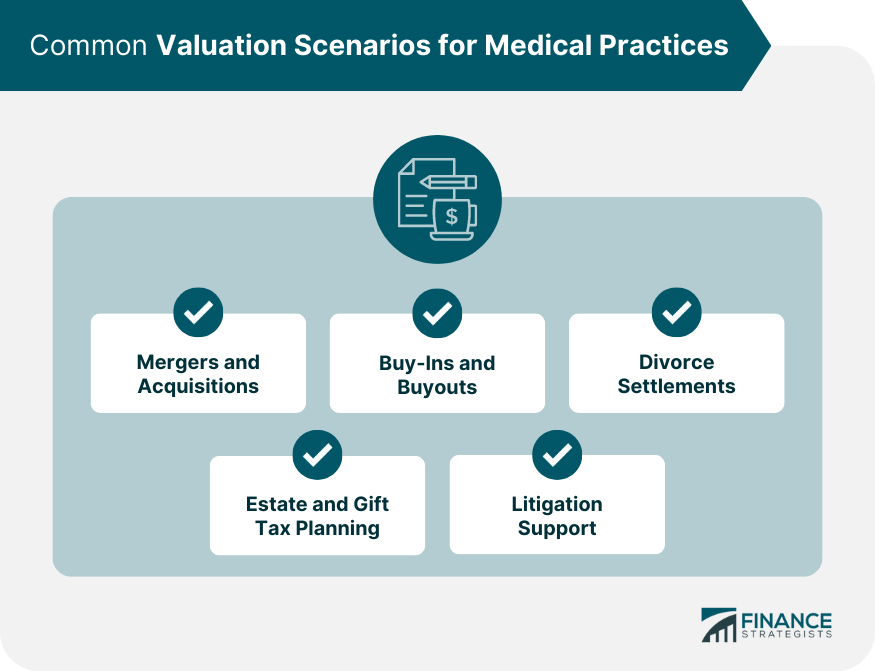Medical practice valuation is the process of determining the value of a healthcare practice, usually in the context of a sale, merger, or acquisition. This valuation takes into account a variety of factors, such as the financial performance of the practice, the patient base, reputation, facilities, equipment, staff, and location. The importance of medical practice valuation lies in the fact that it helps healthcare providers, investors, and lenders to make informed decisions regarding the future of the practice. For healthcare providers, a valuation can help determine the fair market value of the practice, ensuring that they receive a fair price if they choose to sell. A valuation can also help providers who are considering acquiring or merging with another practice to ensure they are getting a good deal. For investors and lenders, a thorough valuation can help them to make informed decisions about whether to invest in a practice or provide financing. By understanding the value of the practice, they can evaluate the potential return on investment and the level of risk associated with the investment. Valuation is also important for financial planning, such as retirement planning, estate planning, and divorce settlements. In these cases, a valuation can help healthcare providers to understand the value of their practice as an asset and ensure that it is properly accounted for in their financial planning.
I'm Taylor Kovar, a Certified Financial Planner (CFP), specializing in helping business owners with strategic financial planning. I once assisted a client in the medical field seeking to value their practice for a potential sale. By meticulously analyzing their financial statements, patient volume trends, and comparing with industry benchmarks, we identified key value drivers not previously considered. This strategic approach led to a valuation 20% higher than initially expected. She gathered enough data to know whether she chose to bring in partners, sell the business, or even expand. Contact me at (936) 899 - 5629 or [email protected] to discuss how we can achieve your financial objectives. WHY WE RECOMMEND: IDEAL CLIENTS: Business Owners, Executives & Medical Professionals FOCUS: Strategic Planning, Alternative Investments, Stock Options & Wealth Preservation The financial performance of a medical practice is a significant determinant of its value. Revenue, profitability, and growth potential are all critical factors that influence a practice's valuation. A stable and diverse patient base contributes to the value of a medical practice. Factors such as patient demographics, patient loyalty, and the number of new patients acquired each year can impact the practice's valuation. The location of a medical practice and the level of competition within the market can have a significant impact on its valuation. Practices in areas with high demand for medical services and limited competition may command higher valuations. The compensation structure for physicians, including salaries, bonuses, and benefits, can affect the valuation of a medical practice. High compensation levels may reduce the practice's profitability and, consequently, its valuation. A medical practice's reputation and the quality of care it provides can have a significant impact on its valuation. Practices with a strong reputation and a history of providing high-quality care may command higher valuations. Both tangible assets, such as medical equipment and real estate, and intangible assets, such as patient records and goodwill, can contribute to the value of a medical practice. The regulatory environment and industry trends can also impact the valuation of a medical practice. Changes in healthcare regulations, reimbursement rates, and emerging trends in the healthcare industry can influence the practice's value. The discounted cash flow method estimates the value of a medical practice by projecting its future cash flows and discounting them back to their present value using a discount rate. The capitalized earnings method determines the value of a medical practice by dividing its normalized earnings by a capitalization rate, which reflects the risk associated with the practice. The guideline public company method compares the subject medical practice to publicly traded companies in the healthcare industry to derive a valuation multiple, which is then applied to the practice's financial metrics. The precedent transaction method analyzes transactions involving the sale of similar medical practices to derive valuation multiples, which are then applied to the subject practice's financial metrics. The net asset value method determines the value of a medical practice by subtracting its total liabilities from its total assets. The adjusted net asset value method adjusts the book value of a medical practice's assets and liabilities to their fair market value, providing a more accurate representation of the practice's value. The AICPA provides guidance on business valuation, including the valuation of medical practices, through its Statement on Standards for Valuation Services. The ASA offers guidance and accreditation programs for valuation professionals, including those who specialize in the valuation of medical practices. The HFMA provides resources and education for healthcare finance professionals, including those involved in the valuation of medical practices. Engaging a valuation professional with experience in medical practice valuation ensures that the process is conducted accurately and in compliance with relevant regulations and industry standards. An experienced valuation professional will have a deep understanding of the regulatory environment and compliance issues specific to the healthcare industry, ensuring that the valuation process takes these factors into account. Valuation professionals with expertise in medical practice valuation will have access to relevant market data, such as comparable transactions and industry trends, which can be crucial in determining a practice's fair market value. Valuations are essential during mergers and acquisitions to ensure that the transaction price accurately reflects the fair market value of the medical practice being acquired. Buy-ins and buyouts involve the purchase or sale of an ownership interest in a medical practice. Valuations help determine the fair market value of the ownership interest being bought or sold. In the case of divorce settlements, valuations are necessary to determine the value of a medical practice as a marital asset, which may need to be divided between the spouses. Valuations are often required for estate tax planning and gift tax planning purposes to determine the value of a medical practice for tax reporting. In litigation situations, such as disputes between partners or shareholders, valuations may be needed to help resolve the conflict by determining the value of the medical practice. An accurate medical practice valuation is crucial for various purposes, such as mergers and acquisitions, buy-ins and buyouts, divorce settlements, estate planning, and litigation support. Ensuring that the valuation process is conducted accurately and in compliance with relevant regulations and industry standards is essential for making informed decisions in these situations. Selecting the appropriate valuation approach and engaging an experienced valuation professional are key factors in obtaining an accurate valuation for a medical practice. By considering the unique characteristics of the practice and the specific scenario for which the valuation is required, medical practitioners and other stakeholders can ensure that the valuation process is conducted effectively and efficiently.What Is Medical Practice Valuation?
Read Taylor's Story

Fee-Only Financial Advisor
Certified Financial Planner™
3x Investopedia Top 100 Advisor
Author of The 5 Money Personalities & Keynote Speaker
Key Factors Affecting Medical Practice Valuation
Revenue and Profitability
Patient Base
Location and Market Competition
Physician Compensation
Reputation and Quality of Care
Tangible and Intangible Assets
Regulatory Environment and Industry Trends

Valuation Approaches for Medical Practices
Income Approach
Discounted Cash Flow Method
Capitalized Earnings Method
Market Approach
Guideline Public Company Method
Precedent Transaction Method
Asset-Based Approach
Net Asset Value Method
Adjusted Net Asset Value Method
Professional Standards and Guidelines
American Institute of Certified Public Accountants (AICPA)
American Society of Appraisers (ASA)
Healthcare Financial Management Association (HFMA)
Importance of Engaging an Experienced Valuation Professional
Expertise in Medical Practice Valuation
Understanding of Regulatory and Compliance Issues
Access to Relevant Market Data
Common Valuation Scenarios for Medical Practices
Mergers and Acquisitions
Buy-Ins and Buyouts
Divorce Settlements
Estate and Gift Tax Planning
Litigation Support

Conclusion
Medical Practice Valuation FAQs
A medical practice valuation is the process of determining the fair market value of a medical practice. It takes into account a variety of factors, such as the practice's revenue, profitability, patient base, location, and competition.
A medical practice valuation is important because it provides a basis for determining the value of the practice, which can be useful in a variety of situations. For example, if a medical practice is being sold, the valuation can help ensure that a fair price is being paid. A valuation can also be useful in estate planning or in the event of a divorce or partnership dissolution.
A medical practice valuation is typically calculated using a combination of financial analysis and market research. The valuation may include an analysis of the practice's financial statements, a review of its patient base, an examination of its competition, and an assessment of its location and facilities.
Some of the factors that may be considered in a medical practice valuation include the practice's revenue and profitability, the age and condition of its equipment and facilities, its patient base and referral network, the experience and qualifications of its providers, and the level of competition in the local market.
Medical practice valuations are typically performed by business valuation experts who specialize in the healthcare industry. These experts may have backgrounds in accounting, finance, or healthcare management and may hold certifications such as the Certified Valuation Analyst (CVA) or Accredited in Business Valuation (ABV).
True Tamplin is a published author, public speaker, CEO of UpDigital, and founder of Finance Strategists.
True is a Certified Educator in Personal Finance (CEPF®), author of The Handy Financial Ratios Guide, a member of the Society for Advancing Business Editing and Writing, contributes to his financial education site, Finance Strategists, and has spoken to various financial communities such as the CFA Institute, as well as university students like his Alma mater, Biola University, where he received a bachelor of science in business and data analytics.
To learn more about True, visit his personal website or view his author profiles on Amazon, Nasdaq and Forbes.















